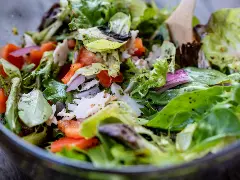

Oregano has been used in a folk medicine for centuries.
Key points
- Oregano has been used in Mediterranean cuisine since ancient times.
- Oregano has antioxidant properties.
- Oregano is easy to grow and preserve.
If you try to follow the Mediterranean diet, which, according to many nutrition experts, is the healthiest way to eat (Rosato, V. et al. 2017), you probably have the oregano herb in your spice cabinet. Oregano plants have been used as a food seasoning since ancient times, and you can find this herb in many of the Mediterranean diet's recipes. It goes well with almost every dish.
(For those readers who are not familiar with the Mediterranean diet, it is a plant-based diet that provides a lot of fiber needed for a well-functioning digestive tract. This diet includes fruits, vegetables, lots of greens, fish and seafood, whole grains, legumes, nuts, healthy fats like olive oil and avocado, fresh herbs and spices, and, of course, red wine.)
Oregano (Origanum vulgare), also called Spanish thyme or wild marjoram, is a flowering plant (bees love it) in the mint family (Lamiaceae). It is a perennial plant, which means that it comes back every spring. It was first cultivated in the Mediterranean region, but today you can grow it almost everywhere. This culinary herb is also used in French and Mexican cuisine. It has a nice smell and can be used as an ornamental plant as well.
Health benefits of oregano
This versatile culinary herb has many potential health benefits and has been used in folk medicine for centuries. It contains vitamins such as A, B, C, E, and K, and minerals such as calcium, magnesium, iron, phosphorus, sodium, potassium, and selenium. It also contains antioxidants such as lutein, zeaxanthin, thymol, and carvacrol. Dietary antioxidants help our body eliminate free radicals, which are toxins resulting from natural processes and environmental stresses.
Oregano possibly has anti-inflammatory, antibacterial, antifungal, antiviral, antiasthmatic, antioxidant, and analgesic properties. It has been used in folk medicine for upset stomach, common cold, respiratory problems, cardiovascular disorder, and nervous disorder. Some research suggests that it may help lower blood sugar levels and gastrointestinal inflammation (Veenstra, J.P. &Johnson, J.J. 2019), and it may have some anticancer properties. However, most of the studies were done on animals and in vitro, and, therefore, more human studies are needed.
Some researchers studied the health benefits of the oregano essential oil, which reportedly has anti-inflammatory, antifungal, and antioxidant properties. It may help in infection treatment and possibly in weight management. (Please talk to your doctor before you take any natural remedies, since they may interfere with your medications.)
Oregano is very easy to grow
As mentioned above, oregano is a perennial plant, which means that it comes back every spring. In the southern part of the United States, it grows over winter, so you can obtain fresh leaves all year long. It grows very well in a garden and requires almost no care. It will also multiply, but is not invasive; it will not take over your garden like spearmint. If you live in a place with harsh winters, you can preserve oregano by drying it. It dries very well. Just make a bouquet with oregano plants and hang it upside down in your pantry until the leaves dry out and use it in your dishes.
As mentioned above, it goes well with most dishes—soups, sauces, stews, goulash, chili, pasta, and any dish that you make with tomatoes. It also goes well with meat dishes; chicken cacciatore is my favorite. However, use it sparingly in salads since it has a potent flavor and can have a bitter taste. Bon appetit!
About the Author Barbara Koltuska-Haskin, Ph.D., is a neuropsychologist in private practice in Albuquerque, New Mexico with over 30 years of clinical experience, and the author of How My Brain Works: A Guide to Understanding It Better and Keeping It Healthy. Her book has won 2 International Book Awards and 5 National Book Awards.
Barbara Koltuska-Haskin, Ph.D., is a neuropsychologist in private practice in Albuquerque, New Mexico with over 30 years of clinical experience, and the author of How My Brain Works: A Guide to Understanding It Better and Keeping It Healthy. Her book has won 2 International Book Awards and 5 National Book Awards.
Dr. Barbara Koltuska-Haskin has received her first foreign translation. How My Brain Works was recently translated into Polish and published in Poland.

References
Rosato, Valentina, Norman J. Temple, Carlo La Vecchia, Giorgio Castellan, Alessandra Tavani, and Valentina Guercio. “Mediterranean Diet and Cardiovascular Disease: a Systematic Review and Meta-Analysis of Observational Studies.” European Journal of Nutrition. (November 25, 2017).
Veenstra, J.P. &Johnson, J.J. ”Oregano (Origanum vulgare) extract for food preservation and improvement in gastrointestinal health” Int J Nutr. 2019; 3 (4)
Vasquez-Olivio, G. et al. “Flavonoids and Phenolic Acids from Oregano: Occurrence, Biological Activity and Health benefits.” Plants 2018, 7 (1).
Rodrquez-Garcia, I. et al. “Oregano Essential Oil as an Antimicrobial and Antioxidant Additive in Food Products.” Critical Reviews in Food Science and Nutrition. Vol. 56, issue 10, 2016.
Adame-Gallegos, J.R. et al. “Potential Use of Mexican Oregano Essential Oil against Parasite, Fungal and Bacterial Pathogens.” Journal of Essential Oil Bearing Plants. Vol 19, 2016, Issue 3.







Comments
Post a Comment